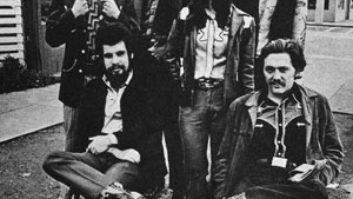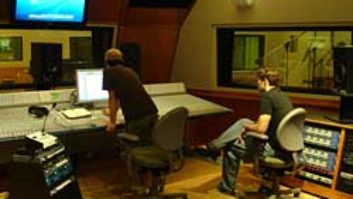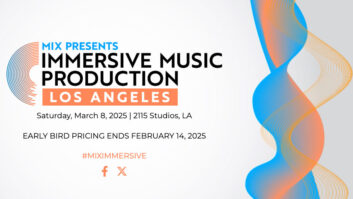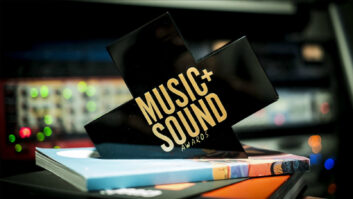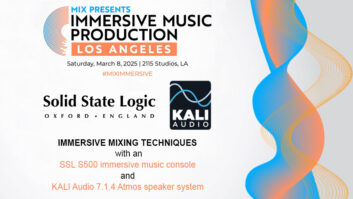Dallas Austin has found success in the music biz by coupling his love of music with an understanding of the listener’s ear. His approach to writing and producing has yielded a number of Gold and Platinum records, Grammy awards, a production company and a record label. Such success has kept the Columbus, Ga., native in high demand during the past ten years.
Austin’s name has mainly been associated with the group TLC; he has produced and written hits on all three of the group’s multi-Platinum albums (sales of their latest effort, Fan Mail, at last count surpassed the 2 million mark). But he has also achieved similar success with such artists as Monica, JT Money, Deborah Cox, Boyz II Men and ABC. In addition, he has produced numerous other high-profile artists, including Michael Jackson, Madonna, Lenny Kravitz, Aretha Franklin and Brandy. Working with this impressive roster of clients, Austin has been able to match their strengths and signature styles with his own production and songwriting methods. When Mix caught up to Austin at his own D.A.R.P. Studios in Atlanta, he was in the midst of completing the latest project from Stevie Nicks.
How did you get your start in music?
My mom owned a nightclub in Columbus, Ga. [From the age of 2, I was] seeing bands going in and out of there playing, and my brothers and [everyone else] were already in bands. Down in Columbus, I would always play in Top 40 bands, in marching bands and all the bands in school. And then I moved to Atlanta when I was like 13 or 14. Because of my reputation in Columbus, people up here had already known me or knew of me, so I eventually started playing in bands and recording stuff to 4-track and trying to shop tapes, but there was nobody here really, except for people like Peabo Bryson and the SOS Band. Joyce Irby had moved here a little while after that, who at the time was in Klymaxx. She was signing people to her production company, and she had a couple of deals at Motown and I think Atlantic or somewhere, and at that point, I just started working on stuff for her Haven City J record with her, and Doug E. Fresh, and the Troop album, and I started trying to get stuff placed through the Motown system. I think that is when I really got connected with Gerald Busby.It sounds like at a very young age you knew music is what you wanted to do.
Oh, yeah. My stepdad played for James Brown for all these years, Jimmy Nolen did all the guitar parts. I would be out on the road with them sometimes, and I was just surrounded with music, period.
I read in ’92 you built your own studio. Why would you ever want to be a studio owner?
For one it makes sense for me because, [Laughs] what really happened was we were working in Bobstown Studios, which is Bobby Brown’s studio up on Northside Drive, working on the ABC album. And basically I think Bobby came in to work on his record in another room one night and sent the security back around and told us we had to leave. After that, being serious and getting kicked out of a couple sessions in places like that where people just wanted to come in and work in their own spot, I had a lot of work and I was like, you know, I can’t take it no more. And plus I always wanted to have a camp of kids that I always worked with, that I bring up, whether it’s interns or engineers who we take from Full Sail [recording school]. I wanted to have a place where young people could develop their skills in production and develop their skills in doing engineering, so that’s what my studio is really based off of. I opened it up and set it up in a way where our production people and even commercial people would appreciate it for Atlanta, because there were no other studios around.
Speaking of Atlanta, it seems like in the past ten years, it has turned into a hotbed of music.
Oh yeah! It started with ABC, and then it went to TLC and Kriss Kross and Arrested Development. And that started the whole new wave of, not only just Atlanta, but that trend in music.
How has SoundScan changed the way you work? Especially since it can track how successful a project is.
Before, you were kind of taking somebody’s word at where you were about how your record did. So, it helps you write more from a marketing standpoint. If you know you want to do a record like “Who Dat” that we had on JT Money, then you know the best place to start it is in the regions of Atlanta and Tennessee and Florida. And if you want to do a record that you know is closer to Noreaga and Nas, you know that the best places are going to be New Jersey and Connecticut, to springboard off of. You don’t want to go put Nas in Idaho and not have enough record sales.
I notice you wear a lot of different hats, switching from executive producer to producer to arranger. How challenging is that for you to fill all of those roles?
It works easy in a sense because I’m a songwriter first, and the production is just the vehicle to get the song where it needs to go. So if I write a “Creep” or “What About Your Friends,” or if I write “Dream on Dreamer” for the Brand New Heavies, those should all go in different directions. It should sound and feel like the Brand New Heavies, and not only because of you writing the song that way. I didn’t realize that I was three or four different people until not too long ago. Because in my age, in my era, you came up listening to Prince or being into Face and L.A. [Reid], or Jimmy and Terry, and all those guys wrote and produced their songs. So, that’s just how I looked at it, all at once. I found out later that, oh yeah, a producer does this, and an arranger does that, and usually a writer writes a song and he doesn’t have to go through all this production and arrangement, but to me, it’s all part of the same thing.
How is production different from arrangement?
Production is more like the sound. It’s your perspective, or the vision that you want everybody else to see from that record. Arrangement is more like: Are you gonna start off with a verse or the chorus, or are you gonna have two choruses or a pre-hook? It’s like the flow of the structure of the song.
Could you give me an example of that on the TLC album?
For instance on “Fan Mail,” the whole purpose of having the song was to, within one three-minute period, give everybody [an idea] of what this record was about and where TLC was gonna be coming from-the whole digital futuristic concept to the record, and also letting the people know that this record is dedicated back to the fans and explaining it to them. So I would take time to do the intro, to set it up where the computer voice would talk and display that information. And then when it comes in, it comes right in with the hook, which is the chorus, and it goes to Tionne singing the verse, the bridge, then back to a hook. Then it goes back to a second verse, then it goes to a double hook and to a breakdown or usually a rap or a bridge, or something else in there. Then you either vamp it out or hook it out, and that would be the arrangement of it.
The production of it comes in where I take the time to go through and find all these space sounds and go through my computer and get sounds off the Internet and go through movies and everything else to find the sound that’s gonna help express this song to these people; also, the typewriters and printers and stuff that’s going on in the background represents all the fan letters and fan mail. Then it has people’s names going through it, it has a sample of Left Eye that I’ve taken from an old interview…Yeah, I heard that. Was that where she says, “All these conflicting fan mail”? I took that and made a hook out of it, kind of like with the “Fan Mail.” That’s more like the production of it, because when people hear it, it totally sounds like what the album cover looks like.
What kind of relationship do you think needs to be present between the producer and the artist for a project to be successful?
I think it has to be really personal in a sense because with most really good artists, consumers have attached to that artist almost like a personality. So if you liked Bobby Brown, you like him because he was a bad guy, and if you liked 2Pac you like him for those reasons also. I think that when you get into songs, they can become answers for people or become understandings for people. Like a friend of mine, he didn’t like nothing but hip hop music. He would be like, “R. Kelly, man, I can’t take these songs, I can’t feel it!” So his girl broke up with him, and he went through the whole phase of not being able to eat and sleep, and he came in one day and was like, “Now I understand what this dude is talking about. Now I understand how he sells records.” People need this stuff to relate to.
So that connection definitely needs to be made?
Oh definitely. A producer [needs to] find the tunnel that takes the artist and transforms this information into what the consumers understand. You have great entertainers: Say, for instance, Stanley Clark is a great bass player, an incredible musician. But when you get down to consumers who buy records, it’s not necessarily people who are gonna understand great musicianship or great singers even. When you’re making a song, then you’re making it for people that almost need to hear simplicity, melody and all that kind of stuff.
At what point, as a producer, do you get involved? Do you always start from square one, or do you ever get someone who says, “Hey man, I got eight tracks of this, here’s where I’m trying to go with it. Help!”
Yeah it goes both ways. Groups like TLC, they can start with a hi-hat, or they can start with some song I was singing in my head while coming to the studio, or they can start with a track I end up writing a song to later. Or say like Stevie Nicks, who I’m working on now, she has been such a great songwriter, period. The thing that has made her Stevie Nicks is pouring out her feelings to people. So, that’s something that I can’t go in and damage, in a sense, because that’s what made her career. So I’ll take your idea of a song, and I’ll produce it and make it where people can get it, and I’ll arrange it and make it where they can understand it-as close as possible without taking away the essence of what you do and what you display in it.
Having worked with artists from Boyz II Men, whose strength is in polished a cappella vocals, to female vocalists like Monica or TLC, what techniques do you employ to accommodate these different singing styles?
With a singing group, because they’re a singing group, you want their vocals to be louder. So you mix them louder, and you mix them brighter and fuller in a sense. TLC, for instance, is about everything, period. They’re about the vocals, they’re about the production, they’re about the concept, they’re about making people visually see what you’re hearing. So you’ll mix that stuff with things that are equally as important as the vocals. And then like with a Monica, with her being a vocalist also, you want her vocals to stand out and put them more in front as a lead vocal and her background not to be as loud. She’s the lead vocalist, and that’s the whole point of mixing it so the consumer can really feel the texture of her voice and really feel every note that she’s hitting it on.
So how do you bring that out in the mix?
I’ll use the AMS or the Eventides-certain effects. Alvin Speights, who mixes a lot of the stuff, a lot of the time uses Finalizer or he’ll use certain compressors to bring out the vocal more. But then when he mixes a street record, so to speak, he uses a lot of Tube-Techs and Pultec EQs-and outboard gear, a lot of outboard gear-that will make it heavier and kind of like dirtier.
I notice on the latest TLC album, there’s a lot of live instruments used, especially on the song “Unpretty.” Why did you employ live instrumentation on this song vs. a sampler, drum machine or some MIDI programming?
From my perspective, if I’m gonna write a song like “Unpretty,” which uses lines like, “You could buy all the makeup that man could make,” or “If you can’t look inside you to find out who am I too.” You wanna make sure that as classic as that line can be, you want the song to be a classic as it can be. And one thing that never goes anywhere is a guitar and a drum set and a bass guitar. There was an era where people got into machines and liked machines more as far as the sound, because it was new and people are always gonna like something new. But I think those [live] elements never really went away as far as different genres of music was concerned. Whether it’s Jamaican music or whether you’re in Spain, or whether you’re in Australia, instruments have never gone away, and they never are gonna go away. On “Unpretty” and a couple of other songs on that record, we went and made sure there was a lot of live instrumentation that went around. And some of them have samples and live instrumentation around it.
Do you see yourself using more and more live instrumentation in the future?
Well, yeah, ’cause I plan to work with a lot more bands this year and a lot more acts that support the live instruments. In a lot of urban music, it’s good that instruments have come back around and are important now. So that part is good. [And people are] also trying to keep moving into other genres of music, which used to be the reason why I would do it before. I would do a Fishbone or Joi, or whoever, just because that was my outlet for doing live instrumentation. And Aeroware, who was really cool for us to have. TLC [was done with] with 50 samples in a song, ’cause that was what was happening.
How has the advancement of music technology changed the way you work, since you started producing?
It’s amazing! I’ve been doing production for the last 12 or 13 years. So I did get to see the Aeroware. You would have to splice tape, and [Laughs] to do an edit would take us days, man! Splicing and splicing…you were sitting there for like a week doing this one drum edit. So now, with Pro Tools, it’s crazy- it saves you so much time and so much money.
It’s funny, in working with Stevie Nicks, I asked her, “So do you want me to fly your guys’ vocals, or do you guys sing them down?” And she was like, “Fly ’em ?” She was like, “No, we just go in there, all three of us at once, and we’ll sing ’em all the way down, and go in and do the other parts. And we’ll stack ’em at that point, or something.” And I said, “Oh, that’s cool.” And they was like, “But you guys fly them down?” and I was like, “Yeah, we take eight bars in and move those through the song, and that takes us five minutes. They’ve been recording and performing since ’78. I’ve been learning. I was eight years old trying to figure it out. So just the difference in my technique and her technique, or Fleetwood Mac’s technique, is really interesting, and it’s working really great.
Now a lot of hip hop producers and engineers are dumping their stuff to 2-inch analog tape, after it’s been in the digital domain, just to warm it up.
That’s the same thing we do here. Even though the digital machines, when you work on them, are a lot faster, the analog machines, still to me, even when you dump ’em, it sounds different than when you record to them.
Do you use any digital audio and then dump it to analog tape? What’s your setup like?
Most of the time we run analog and dump it to DAT at the end of the day; and also dump it to tape. But when we get to mastering, it depends on what we’ll use, but usually all of the direct outboard stuff is still analog. We have a lot of analog stuff here.
Right now, what’s got you excited? I got a lot of great projects lined up, but I think the most exciting thing is we’re opening D.A.R.P. Mastering next door. My studio has been in business so long now that it’s functioning and running great. I never thought I would be in the studio owner business as a studio owner. But because Atlanta wasn’t really an industry [city], and my studio got a seven-year start on all the other studios, I’ve been able to develop not only a brand, but also the income that it takes just to grow-be a viable business on its own without me dipping into it or digging it out.
Monica Tannian, the studio manager, has done a great job. It’s funny, she worked at Cajun, which is the studio I did Boyz II Men at, and basically, we had no money to get food, so she would splurge for us to get food. After I got my studio up, for a couple of years, I just wanted it to myself and the producers [Laughs], which meant we had to pay for it! At a certain point when I decided to really open it and get a clientele of people that like to work here, I had to bring in a good person to do it. So we called up to Philly and asked if she would come down and run the studio and get stuff going. She had a great clientele of people, so between her and Rick Sheppard, and I guess Alvin, who’s been here the longest, we’ve just been trying to make sure the studio stayed on top. The technology is really the hardest part of owning a studio. So either we’ll have Rick figure out Pro Tools when it all came in, and now we’re getting ready to change the whole setup-get a 9000 and get everything pumping, and get the mastering lab up next door, ’cause there’s no mastering in Atlanta.
Well, that basically means you could keep everything in-house then.
Oh, yeah, and it works good for everybody else. There are enough labels here and a ton of producers that if we could run back out to our car and hear the total finished thing, and send it off here the next day, it would be a big convenience for all of us. Just for me alone, in my camp of producers, we do a lot of work, so it will work good for us. It will be a real viable mastering studio.
When it comes time to mix, do you touch the faders and the knobs?
Oh, yeah, I, uh, [Laughs] have to touch ’em. At the end of the day, the mix engineer…we use Alvin a lot and I use Leslie Brathwaite, who’s also like my tracking engineer; Leslie is also a producer. Everybody has different sounds. So if you really want your stuff to be a great mix, you use Alvin, ’cause you know he’s gonna sit there and go through every hi-hat, clean every vocal and touch everything to death. He’ll take a couple of days making sure your mix is an immaculate mix.
When you want stuff to sound harder or more of an ear close to the street, Leslie is better for having stuff kind of raw and great-sounding but still really raw-sounding. Everybody has a different sound, and they’ll get it up to their points, EQ’ing and putting in effects. Then I’ll come in and do all the levels, say it’s not enough high end on this, [I’ll] come in touching all their knobs, doing it the wrong way, so they can do it the correct way after cleaning me up. But we’ve been working together; all these people have been around me since I was 15. It’s funny ’cause we have that eye contact thing. Debra Killings has been doing all the backgrounds for us forever-all the TLC, everybody’s stuff in Atlanta and everywhere else. All of us work together so fast; it’s basically eye contact. We can do a song, a whole entire song, in entirety, in like 45 minutes. From writ’, to track, to backgrounds flowing around it, from all of us just sitting there.
I notice people keep coming back to you. What is it that you bring to an artist, a label or a project that makes it so successful?
I think when I write and produce, I write and produce from a marketing standpoint in the first place. I think that a lot of producers do. I don’t think all producers do, but I think there’s two approaches you can take to it. Some producers have a sound, and they go off on a record, and it can get popular, and they do every other record out of that same sound. So, it develops a brand as far as the sound is concerned. I think the approach that I take is bringing out each individual. So if I’m gonna do a N’Dea Davenport, then I can’t bring up the TLC sounds and do her record. Because then she’s not N’Dea Davenport from the Brand New Heavies who should be the queen of the retro soul thing that was happening. Then if I’m gonna do Joi, and then for me to bring up the Boyz II Men sounds on Joi, she would just jump off a building like, “I can’t do it!” Or get with Fishbone and say, “Well, here’s the sounds I used for Madonna.”
When you have pop artists, you have to make sure they’re a part of the trend that’s going on, with their own switch to it and make sure the music is friendly to the masses of people. I like to work on a lot of subculture artists too, so you have to understand. If you wanna work with somebody that likes drum ‘n’ bass, or if you want to work with Tricky, then you have to have an understanding for ’em. Or they wouldn’t call you or accept that project in a sense, ’cause it would be an injustice if you said, “Here’s a track from TLC that I was gonna do on Tricky.” It wouldn’t bring out the essence of why this guy sells records.
Because you’ve worked with Michael Jackson, Lenny Kravitz, TLC and others, I can’t seem to place you in one genre of music. What kind of producer do you consider yourself?
Just a music producer. I think that it’s good that it’s different genres of people. Like, you have House music producers, or you have hip hop music producers, because that’s what makes the world go around. Fortunately, I’ve been given a gift to be a music producer, period. So I take songs and turn ’em into music. So can we expect a jazz album from you? Yeah, [Laughs] I used to say to people when I was younger, when I would first meet Clive Davis or Gerald Busby, “Hey man, yeah, I did ‘Don’t Take it Personal’ with Monica, but don’t get it wrong, I do music, and there’s so much stuff that I can do!” So when you’re saying it, it’s kind of like, okay, cool, but when the people say it is when it’s really true. So that’s what I’ve worked hard at and will continue to do-being a music producer and not to get held in one genre of music.
